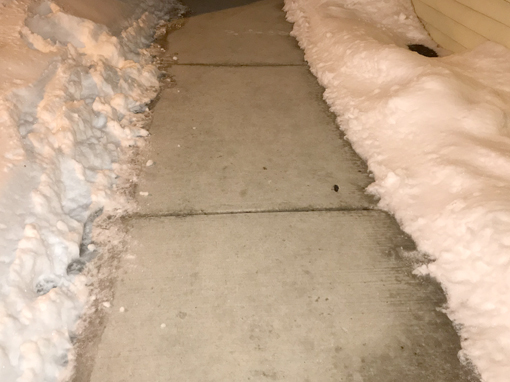We are often asked what products we recommend to melt ice or improve traction on stoops, steps, walkways and driveways. Many of the items on store shelves are composed of chlorides that are harmful to concrete, mortared areas, pets and the environment. Before you decide on an ice melt, take the time to read the label on the bag so you know the possible risks involved.
Sodium chloride, commonly known as rock salt, is readily available and works at temperatures as low as 20 degrees Fahrenheit. However, it is the most harmful ice melt to plants, paving and pets’ paws. It’s cheap, about $6 for a 25-pound bag.*
Potassium Chloride, which is also used in fertilizers, will not harm plants, but works slower than rock salt. Like rock salt, it’s also harmful to concrete, mortared areas and other natural products such as bluestone.
Calcium chloride melts faster than the others, works down to 5 degrees Fahrenheit and is one of the least harmful salts to concrete, but is damaging to plants. Peladow is composed of 100% calcium chloride and is regarded as a premier snow and ice melter, generating heat on contact with ice and snow, and effective to -25 degrees Fahrenheit. It costs about $45 for a 25-pound bag.*
Magnesium chloride melts faster than sodium chloride, is less corrosive to metal and concrete, less toxic to plants and more environmentally friendly than sodium chloride. This is a better choice over sodium chloride you want an ice melt that works quickly, is less toxic to plants and is effective to 13 degrees below zero. Safe Step 8300, composed of 100% magnesium chloride, costs about $30 for a 50-pound bag.*
It is important to remember to use each of these products as directed. We also advise not using any ice melt on new concrete or mortared areas for at least two seasons.
Environmentally Friendly Options
Environmentally friendly skid-proofing agents such as sawdust, peanut hulls, ground bark, ashes, gravel and sand can be used in conjunction with ice melts. They don’t dissolve in water and can be swept up for re-use, or swept into the lawn or planting beds without harm to plants.
Households with children and pets are particularly concerned about the toxicity of ice melts. The product Safe Paw is considered to be pet, child and environmentally safe. It’s 100% salt free, with a patented dual-effect compound made of a modified crystalline amide core infused with a special glycol admixture and traction agents. It cost about $65 for a 35-pound pail.* This and similar products are chloride-free, so application won’t harm your concrete, paved areas, lawns or plants.
Application Tips
Clear snow prior to applying. Wear gloves and apply a thin layer of ice melt with a cup. If you over-apply in a spot, disperse it with a broom. Used in excess, ice melt may harm your plants and can damage concrete, mortared areas and natural stone products. Avoid shoveling snow from salted walks onto plants and know the ingredients in the ice melt you buy. In the spring and fall, use gypsum calcium sulfate on areas where salt accumulation is heavy. Irrigate well in order to wash away the salt and decrease the potential damage to your planting beds. Finally, keep salt away from sensitive plants such as azalea, crabapple, dogwood, forsythia, holly, maple, rhododendron and yew.
*Prices found online on 2/13/18.

